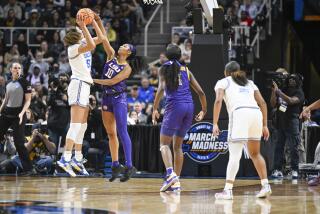Readers React: Two views of football in America
To the editor: Mark Edmundson’s statement that war can be “beautiful” to describe the appeal of football embodies the worst of American jingoism. (“Kicking the football habit,” and “We are what we love: For Americans, that means the warlike game of football,” Opinion, Aug. 24)
The fetishizing of violence and the invincibility of our military is what has led us into so many costly misadventures abroad.
When George W. Bush’s inner circle was contemplating whether to invade Iraq, it’s no coincidence that the two men who thought it was a bad idea were the ones in the room who had actually been in combat.
War is not beautiful.
John Wolfenden, Sherman Oaks
..
To the editor: Bravo for your parallel views on football in America in the weekend paper.
Taken together, they beautifully sum up my own perceptions of the evolution of this athletic pastime into a national religion — and why I approach the next several months of tumult and shouting with a mixture of resignation and apathy.
I cherish baseball. I thrill to the NBA. But I am simply not a football guy.
(Of course, I’m guessing you knew that when I started my letter with the word “Bravo.”)
R.C. Price, San Clemente
..
To the editor: Edmundson’s equating the rise in the popularity of football to our increased acceptance or recognition of our warlike nature is interesting but wrong.
Football has always been more exciting than baseball. The rise in the popularity of football was a direct result of the rise of television. Once the game became available to millions at home, it was no contest.
Michael Gitter, Pacific Palisades
..
To the editor: Gimme a break. Nobody cares whether your writer watches another football game.
The injuries suffered by players are tragic, and the NFL must and will continue to make progress in doing as much as can be done to prevent such injuries.
But, hey, football is a game of blocking and tackling with force, and then taking care of the players who suffer the injuries.
The greater travesty is that The Times’ editors published this nonsense. I am still wondering why I read the article to the very end.
By the way, I played fullback/linebacker for the University of Illinois in the early 1960s and represented several NFL players through my law practice.
Bruce Singman, Pacific Palisades
..
To the editor: I don’t disagree with Edmundson about the effects of the football culture, but I think he needs a better argument.
It is simplistic to say that Americans were peace-loving before the rise of football.
He doesn’t address 1861 and 1898, and the long period of “peace” between those conflicts. And what were we doing then? Oh yeah, exterminating the natives of the continent.
Charles Otwell, Orange
..
To the editor: Since the 1940s, America has been at war or on the brink of war (the Cold War).
So it’s not surprising that during that same period, the NFL has grown exponentially.
A sport based on violent contact and physical confrontation, with such military terms as blitz, bomb, aerial attack and battling in the trenches, reflects the national culture.
What other team sport utilizes such overtly militaristic phraseology? And you may have noticed that stealth bombers are not infrequent visitors to the Super Bowl.
Prior to this time, baseball was our national pastime. No more. The warrior culture has become us, and so too has football.
Bob Teigan, Santa Susana
Follow the Opinion section on Twitter @latimesopinion
More to Read
A cure for the common opinion
Get thought-provoking perspectives with our weekly newsletter.
You may occasionally receive promotional content from the Los Angeles Times.






